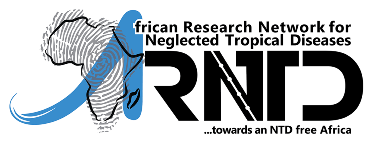Value
The ARNTD was created because a gap had been identified in the growth and promotion of African NTD researchers, their research capacity and potential to empower the next generation of African NTD researchers. The ARNTD also aims to be a sustainable collaborative Network between researchers, policy makers and implementers working towards an Africa free of NTDs. Additionally, the 2nd WHO report on NTDs “Sustaining the drive to overcome the global impact of neglected tropical diseases” published in 2013, has identified capacity-strengthening as a top priority to accelerate interventions against NTDs at country level. Thus there is ample justification for the operations of the ARNTD.
ARTND comes in to fill a critical gap in NTD control and elimination – that of multidisciplinary research on urgent research questions needed to move control and elimination goals to reality, in Africa, with African research leadership, and is unique in the following ways:
- ARNTD is the only African based network, spear-headed by Africans that does not exclusively focus on a single NTD or theme and is composed of individuals from a variety of disciplines across the health, social and management sciences, including policy makers
- The Network’s scope extends beyond basic research and vaccine studies to include operational research, social science and implementation research, zoonosis and co-infection studies
- ARNTD has a membership spread across up to 20 countries, including Anglophone, Francophone and Lusophone countries
- African NTD researchers, including EFINTD Fellows conceived the idea of an ARNTD, set it up and are driving the agenda with great commitment to its success.
Objectives
The objectives of the ARNTD can be broken down into four main objectives, each with a number of sub-objectives which expand a bit further on the main objective under which they fall:
- To create a prestigious research network which is attractive to individuals with different expertise relevant to NTDs in Africa;
- To build high-achieving partnerships with different stakeholders in the field of NTD research, control, and advocacy – including governments, UN- and other multilateral organisations, NGOs and funders;
- To seek for and to organize regular forums which bring together members of the network and others involved in the fight against NTDs;
- To promote the work of disciplinary expert groups (research focus areas) and interactions amongst them within the network.
- To give voice to affected communities through stimulation of participatory research and intervention;
- To establish a pool of advocacy experts who will support the network in drawing attention to NTDs and the work of the network both locally and internationally;
- To raise funds locally and internationally to facilitate the mission and work towards realizing the vision of the network.
- To support South-South networking fellowships and travel grants aimed at advancing research collaboration;
- To leverage the network in engaging in and supporting mentoring activities for young researchers;
- To facilitate engagement between the network and institutions carrying out NTD research across Africa;
- To strengthen inter-institutional relationships by promoting the conduct of south-south collaborative research involving the sharing of information, samples, infrastructure, and experiences;
- To develop and offer targeted courses relevant to NTD research and control, including e-learning.
- To develop and maintain a dedicated website which facilitates networking, knowledge exchange and engagement of members and other stakeholders;
- To publish a Newsletter showcasing the work of the network and other NTD-related activities on a regular basis to be circulated widely;
- To design diseases/discipline – specific policy briefs which will be regularly updated and circulated among relevant stakeholders.
Contact
KNUST, Kumasi, Ghana

